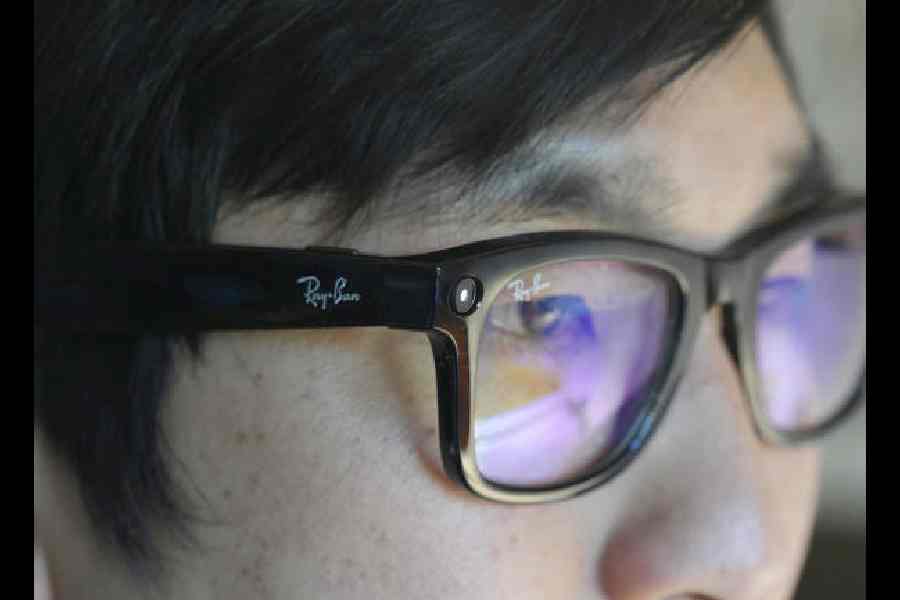I have been using a new camera to secretly snap photos and record videos of strangers in parks, on trains, inside stores and at restaurants. I wasn’t hiding the camera, but I was wearing it, no one noticed.
I was testing the recently released $300 Ray-Ban Meta glasses. The glasses include a camera for shooting photos and videos, and an array of speakers and microphones for listening to music and talking on the phone.
The glasses, Meta says, can help you “live in the moment” while sharing what you see. You can livestream a concert on Instagram while watching the performance, for instance, as opposed to holding up a phone. That’s a humble goal, but it is part of a broader ambition in Silicon Valley to shift computing away from smartphone and computer screens and toward our faces.
Meta, Apple and Magic Leap have all been hyping mixed-reality headsets that use cameras to allow their software to interact with objects in the real world. Recently, Zuckerberg posted a video demonstrating how the smart glasses could use AI to scan a shirt and help him pick out a pair of matching pants.
For the past seven years, headsets have remained unpopular, largely because they are bulky and aesthetically off-putting. The minimalist design of the Ray-Ban Meta glasses represents how smart glasses might look one day if they succeed. Sleek, lightweight and satisfyingly hip, the Meta glasses blend effortlessly into the quotidian. No one — not even my editor, who was aware I was writing this column — could tell them apart from ordinary glasses, and everyone was blissfully unaware of being photographed.
After wearing the Ray-Ban Meta glasses practically nonstop for a month, I was relieved to remove them. While I was impressed with the comfortable, stylish design of the glasses, I felt bothered by the implications for our privacy. I’m also concerned about how smart glasses may broadly affect our ability to focus. Even when I wasn’t using any of the features, I felt distracted while wearing them.
Meta said that privacy was top of mind when designing the glasses. “We know if we’re going to normalise smart glasses in everyday life, privacy has to come first and be integrated into everything we do,” the company said.
Always distracted
My first test with the glasses was to wear them at my bouldering gym, recording how I maneuvered through routes in real time and sharing the videos.
I was surprised to find that my climbing, overall, was worse than normal. When recording a climbing attempt, I fumbled with my footwork and fell. After removing the glasses, I completed the route.
I had problems concentrating while driving a car or riding a scooter. Not only was I constantly bracing myself for opportunities to shoot video, but the reflection from other car headlights emitted a harsh, blue strobe effect through the eyeglass lenses.
Privacy eroded
To inform people that they are being photographed, the Ray-Ban Meta glasses include a tiny LED light embedded in the right frame to indicate when the device is recording. When a photo is snapped, it flashes momentarily. When a video is recording, it is continuously illuminated.
As I shot 200 photos and videos in public, including on BART trains, on hiking trails and in parks, no one looked at the LED light or confronted me about it. And why would they? It would be rude to comment on a stranger’s glasses, let alone stare at them.
The issue of widespread surveillance isn’t particularly new. The ubiquity of smartphones, doorbell cameras and dashcams makes it likely that you are being recorded anywhere you go. But Chris Gilliard, an independent privacy scholar who has studied the effects of surveillance technologies, said that cameras hidden inside smart glasses would most likely enable bad actors — like the people shooting sneaky photos of others at the gym — to do more harm.
Slice of life moments
Although the Ray-Ban Meta glasses didn’t make me feel more present or more safe, they were good at capturing a particular type of photo — the slice-of-life moments I wouldn’t normally record because my hands would be preoccupied.
But while these types of moments are truly precious, that benefit probably won’t be enough to convince a vast majority of consumers to buy smart glasses and wear them regularly, given the potential costs of lost privacy and distraction.
It’s easy to imagine, however, some apps that could make smart glasses eventually go mainstream. A holographic teleprompter showing talking points in the corner of your eye while giving presentations, for example, would be killer.
NYTNS










